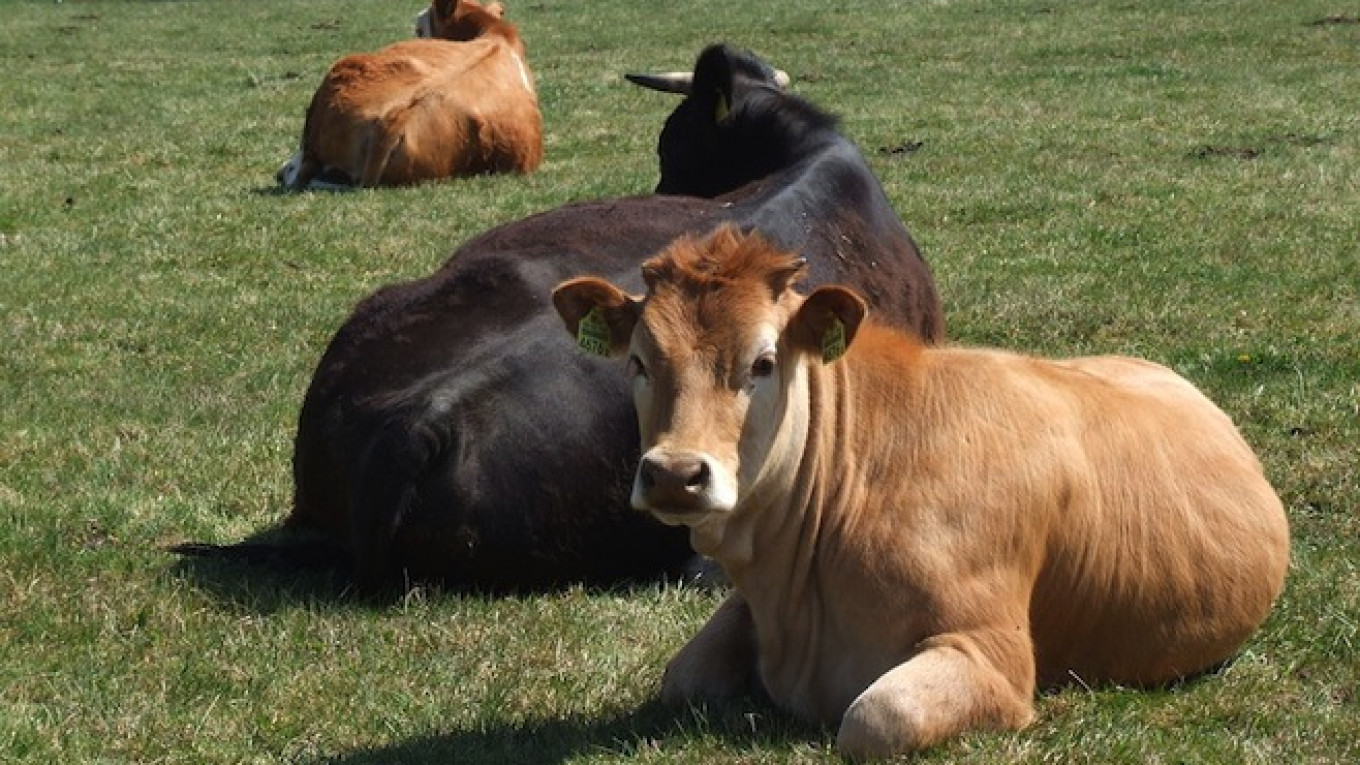A proposal by Prime Minister Dmitry Medvedev to cap the quantity of poultry, sheep, pigs and cattle Russians can own without registering as farmers provoked an outcry Tuesday and accusations that the measure would mark a return to Soviet-style pressure on smallholders.
Medvedev has ordered the Agricultural Ministry to coordinate a consultation period on the issue and decide by Sept. 23 whether a change to the law is necessary.
“We have only just got on our feet and we are already being told: 'That will do, you're fat enough as it is' … we are completely against such an initiative!” Yury Nikulin, a smallholder raising goats in the southern Siberian region of Altai, told Russia's Regnum news agency Tuesday.
Despite a decade-long decline in the face of competition from large-scale agricultural companies and modern technology and equipment, smallholding farming remains a key means of support for many Russians and still accounts for a significant part of the country's agricultural produce.
Smallholdings supply about 10 percent of the country's poultry and milk, up to 30 percent of its pork and about 50 percent of its beef, according to Andrei Sizov, head of agricultural consultancy SovEcon.
Dodging Taxes
Medvedev's move followed a meeting in the Black Sea city of Sochi last week during which the governor of the southern Russian region of Stavropol, Vladimir Vladimirov, said people were exploiting the existing rules so as not to pay taxes.
“There is no proper definition of smallholding in Russia … there are people, ostensibly smallholders, who have flocks of 14,000 sheep and 1,500 cattle,” Vladimirov said, according to a transcript on the government's website.
The governor asked Medvedev to introduce changes to existing legislation or give the regions the power to set limits. “For us, for Stavropol, I'd say [a limit of] five cows and 20 sheep,” he said.
The amount of land that smallholders can cultivate is already legally fixed.
Slaughter Them All?
Smallholders who own more than the regulated number of animals will face a tough choice if Medvedev's proposal becomes law, according to Vyacheslav Telegin, chairman of the Russian Association for Household Farming and Agricultural Cooperatives.
“What should I do if I have more livestock? Slaughter them all?” Telegin told The Moscow Times by telephone.
Another option would be for smallholders to register as commercial enterprises, but that entails extra bureaucracy and legal requirements such hiring an accountant, according to Telegin.
If implemented, the restrictions would deal a body blow to smallholders in Russia and could cut the total numbers of livestock, according to experts.
Small-scale farming in Russia has contracted in recent years in the face of the competition from large agricultural companies with modern equipment, and households find it much harder to obtain state support or bank loans than larger holdings, according to SovEcon's Sizov.
In a video address to President Vladimir Putin last month, a farmer in Russia's Kursk region threatened to burn the entire harvest of her small farm because she could not get state support.
Ulterior Motives
Putin replaced Russia's agricultural minister earlier this year, appointing a regional governor from southern Russia in an apparent bid to galvanize domestic food production.
Alexander Tkachyov has reportedly sought to make his mark in the new position with a series of headline-grabbing initiatives. He was responsible for a controversial tightening of import controls that have seen Russian customs officials destroying illegally imported food.
Some experts alleged that the proposed new restrictions on livestock are the result of lobbying from large agricultural outfits that would gain from reduced competition.
“It's pressure from big business that wants to get rid of small producers,” said Vasily Uzun, a professor specializing in agrarian politics at the Russian Presidential Academy of National Economy and Public Administration in Moscow.
A similar proposal was made by local deputies in the Stavropol region in 2009, who argued that smallholders did not observe health and safety regulations, but it never became law.
Soviet Echoes
Experts warned Tuesday that the government should not forget lessons learned from Nikita Khrushchev, the Soviet leader in the late 1950s, who imposed restrictions on small-scale farmers, driving many into poverty and creating social tension as people left to seek employment in the cities.
“It's a social question," said household farming association chairman Telegin. "If people don't have livestock then they don't have work."
The ideology of communism was opposed to private ownership, a position realized most brutally in Stalin's forced collectivization of the 1930s, but even in the Soviet Union there was a recognition of the economic importance of smallholders, according to agrarian politics expert Uzun.
Current government policy, including the proposal from Medvedev, could add to economic problems and end up killing off Russia's household farming industry, according to Uzun.
“It's an unprecedented level of pressure that didn't even exist in [the last decades] of the Soviet Union,” he said. “The market has realized the Soviet dream of destroying smallholders.”
Contact the author at h.amos@imedia.ru
A Message from The Moscow Times:
Dear readers,
We are facing unprecedented challenges. Russia's Prosecutor General's Office has designated The Moscow Times as an "undesirable" organization, criminalizing our work and putting our staff at risk of prosecution. This follows our earlier unjust labeling as a "foreign agent."
These actions are direct attempts to silence independent journalism in Russia. The authorities claim our work "discredits the decisions of the Russian leadership." We see things differently: we strive to provide accurate, unbiased reporting on Russia.
We, the journalists of The Moscow Times, refuse to be silenced. But to continue our work, we need your help.
Your support, no matter how small, makes a world of difference. If you can, please support us monthly starting from just $2. It's quick to set up, and every contribution makes a significant impact.
By supporting The Moscow Times, you're defending open, independent journalism in the face of repression. Thank you for standing with us.
Remind me later.


